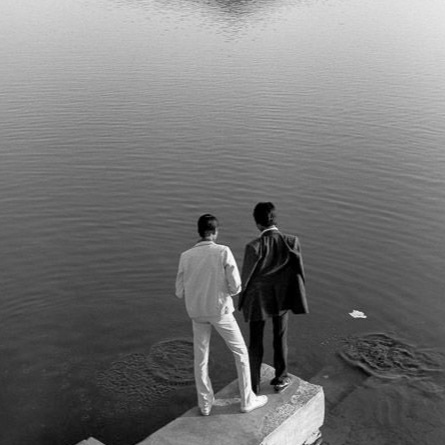“I’m mainly a teacher and have been for the last 20 years, so it’s very easy to bring that energy into this,” the singer turned conductor reveals later. “I teach one-on-one now, but I used to teach in classroom settings at Bombay International School and JBCN International School in Mumbai.” When I point at the multi-generational cohort that is present in the room today—different from the age range she mentors as a school instructor—she says, “I feel like if you treat everybody like they’re the same age, they act like they’re all the same age.”
Perhaps this is why throughout the session, voices, old and young, uninhibitedly sing along to nursery rhymes like ‘Old MacDonald’ and ‘Twinkle Twinkle Little Star’, imitating Sahi as she changes her pitch, volume, rhythm, and even accent. “Does anyone here think they have a bad voice?” she asks at the start of the session. A few sheepish hands go up. “My hope is that everyone leaves with that belief gone,” she responds, “In a choir, different voices and textures are not only cherished but also necessary.”
After concluding season one, with performances featuring 410 people across six cities, and taking a two-week hiatus, Sahi announced season two of The Strangers’ Choir last month. The nine-city tour started at the beginning of September and goes on until mid-November, echoing through art galleries, meditation centres, theatres, and restaurants across India. From Hyderabad to Mumbai, Bengaluru to Gurgaon, Kolkata to Kochi, large groups come together in each city to learn a song that Sahi has selected in advance. “I pick the song way too close to the day of the event because I’m always unconvinced until something really clicks,” the singer confesses. “Still, this season has been a little more planned out because I now have a better idea of each city’s personality, which helps me choose a song. In Goa, for example, we sang ‘Mamma Mia’,” says Sahi whose repertoire has included covers of KT Tunstall’s ‘Suddenly I See’, Lord Huron’s ‘The Night We Met’ and MILCK’s ‘Sisters of Winter’.
At the Mumbai session I am attending, the selected tune is Coldplay’s ‘Viva La Vida’ (“I feel like I’m at a Coldplay satsang,” I overhear someone say), preceded by two practice tracks: Perry Como’s ‘Catch a Falling Star’ and ABBA’s ‘Super Trouper’.
Based on our comfort with pitch, Sahi asks us to choose one of three groups: low harmony, high harmony or main melody. I fit into high harmony and am surrounded by members with elastic vocals, which means that throughout the session, I can hardly hear the other parts of the song. Strangely, this doesn’t bother me or anyone around me: we are laser-focused on getting our bit right and contributing to the choir as a whole, regardless of whether we get to enjoy listening to the fruits of our labour. Sheets with lyrics are handed out and Sahi encourages us to use a pen to mark parts of the song according to her instructions. Momentarily, it feels like I’m back in school.
Just because the crowd is mostly untrained singers does not mean that Sahi treats us as amateurs. In fact, she constantly presents challenges, incorporating serious music components—from harmonies and crescendos to staggered starts and choir rounds—then explains them in layman’s terms. Surprisingly, it takes most attendees only a few seconds to get the hang of it all: as soon as Sahi’s pitch changes, so does everyone’s. If she goes faster, the room instinctively picks up pace. Maybe what we’ve always needed is just a good teacher.
For three hours, Sahi’s excitement never drops: at all times, she is everywhere, ready to crack a joke or re-explain a tune. Every few minutes, she sits back at her keyboard, playing, then replaying, the song to guide each group. Sustaining this energy till the very end, she says, is “a pleasure, not a challenge”.
The real challenge, for her, is the logistical work—from venue selection to social media—which she entirely handles. New shows are announced on The Strangers’ Choir’s Instagram, usually a day before registrations open on Blogspot, with each ticket costing ₹1,250. “When I call venues to ask if we can host the choir there, the answer is often no,” she shares. Zeba World was one of the few venues that reached out to her first, asking her to host the choir in their space. “My dream for the near-future is to do a big, church-like venue with lots of people and better acoustics,” she says, before adding, “I need at least two months to recover before season three.”
The nostalgia and intimacy created by this three-hour-long modern baithak—the act of sitting together on the floor with our phones away, focusing on singing one song and hearing our voices unexpectedly blend together—is the perfect antidote to the infamous loneliness epidemic. Around me, people affably correct each other, compliment each other’s outfits and borrow pens to mark new changes in the tune. There is an air of familiarity, as if we’ve spent days together in this room. Halfway through the session, I notice an older, bespectacled woman who smiles widely throughout, singing with unbridled joy and clapping delightedly when others sing. Later on, I introduce myself to her, confessing I had more fun simply because I was watching her have so much fun. “I loved it, I love music,” says the retiree, “My friend attended one of these some time ago and told me I had to go. I’ve been waiting for two months for them to return to Mumbai.”
For nearly half an hour after the session is over, Sahi makes a point of meeting every attendee and taking photos with them while saying goodbye. One of the seven-year-old children who was seated next to her animatedly tells her he had “sooo much fun”. Another woman gifts her a cake. “My favourite moment of The Strangers’ Choir actually happened today,” she tells me later. “There was an elderly lady, over 60 years old, and she hugged me with tears in her eyes. She said, ‘My mum passed away a week ago and she told me to live my life. And I’m so glad I got to come here and do that.’ I started to cry.
The healing capabilities of music have long been proven scientifically: it lowers the production of cortisol, which lowers stress, and reshapes neural networks. It is known to help plants grow better. And help people bond and connect. Sahi concedes that it is an honour to bring this therapeutic experience to people but it is obvious that she, too, is transformed at the end of every session. You only have to look at the expression of pure bliss on her face as everyone sings. And then, just to make it exceedingly clear, she claps her hands and exclaims: “I can’t believe this is my life!”
Register here for season two of The Strangers’ Choir. The upcoming sessions will take place at Shoonya, Bengaluru on September 27 and 28; at Kalakriti Art Gallery, Hyderabad on October 12; at Art Cafe, Kolkata on October 26; at Monalisa Kalagram, Pune on November 2; at Apparao Galleries, Chennai on November 9 November and at AAL Studio, Kochi on November 16.








